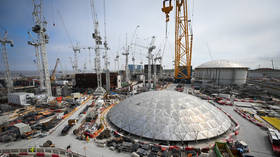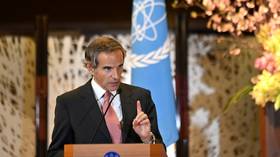UK commits nearly $1bn to nuclear program

The UK government revealed plans on Monday to boost Britain’s nuclear sector, for energy and defense, including massive investments in the future workforce and in its submarine program, which London views as its “vital” at-sea deterrent.
UK Prime Minister Rishi Sunak has announced a package of public and private investment which is expected to cover the needs of Britain’s growing nuclear energy industry and to create 40,000 new jobs by 2030.
The British government plans to partner with defense companies BAE Systems, Rolls-Royce and Babcock, as well as with French energy giant EDF, to invest more than £763 million ($961 million) by the end of the decade in the relevant skills, jobs and education, it said in a statement.
Last year, the UK unveiled a plan to build eight new reactors and new-type small modular reactors by 2050, in an effort to produce 24 gigawatts of electricity, enough to provide a quarter of the country’s needs.
The government also announced a commitment to invest up to £300 million ($379 million) in the production of the HALEU fuel required for new high-tech reactors, which is currently only commercially produced in Russia.
“Meeting the UK’s ambitious nuclear targets will require a huge ramp up in all parts of the workforce, from engineering to construction,” Tom Greatrex, Chief Executive of the Nuclear Industry Association, said, commenting on the new investment plan.
The major development initiative comes as the UK authorities work to ensure there will also be enough nuclear-energy-focused workers for the construction and maintenance of its fleet of submarines, which the UK considers vital for its national security, as they are the core of its continuous at-sea nuclear deterrent.
“Safeguarding the future of our nuclear deterrent and nuclear energy industry is a critical national endeavor,” Sunak said, as quoted by Reuters.
Britain is set to expand its submarine industry, boosting its fleet under the AUKUS security pact. AUKUS (Australia, UK and US) was established in 2021. Under the pact’s Pillar 1, the US and UK pledged to help Australia acquire nuclear-powered submarines, while Pillar 2 is a broader technology-sharing agreement.
On Monday, the British Ministry of Defence published the ‘Defence Nuclear Enterprise Command Paper,’ in which it underscores the need to “sustain Britain’s nuclear deterrent “in a period of heightened risk and volatility that is likely to last beyond the 2030s.”
The document also revealed that Britain is developing a new replacement sovereign warhead, while progressing with the new Dreadnought Class submarines, bringing these into service in the early 2030s.














